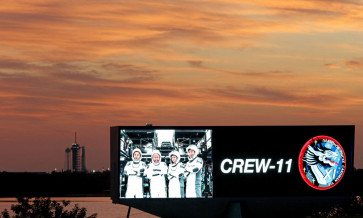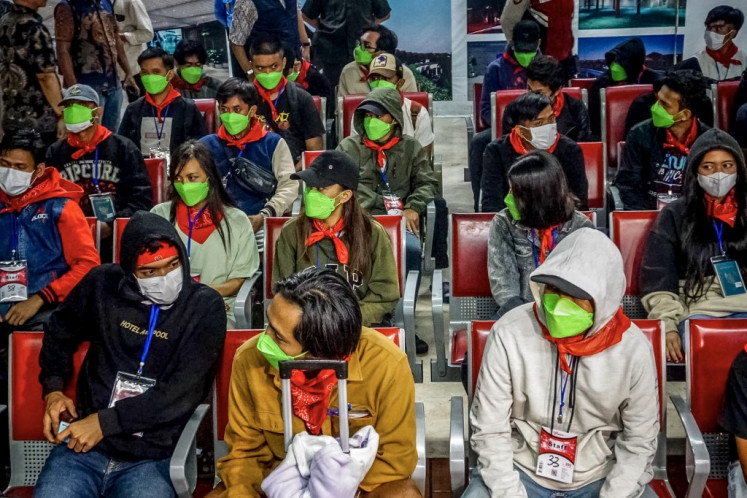Popular Reads
Top Results
Can't find what you're looking for?
View all search resultsPopular Reads
Top Results
Can't find what you're looking for?
View all search resultsIndonesia, it’s their right, give them the much needed fuel subsidy
You can pay me now or pay me later is a common mantra in the world of maintenance
Change text size
Gift Premium Articles
to Anyone
Y
ou can pay me now or pay me later is a common mantra in the world of maintenance. With Indonesia’s vast wealth (over 50 percent of its exports are oil, gas, or coal), and large foreign investment inflows, the fuel subsidy is essentially crumbs off the table for its people.
Yet, Indonesia’s proposal to eliminate the subsidy, and increase the price of a liter of petrol around April 1, 2012 is going to leave many lower income people in the lurch, and is simply too abrupt and misguided to apply without a serious review of some key factors:
First, failure to link Indonesia’s vast resources with sustainable human development through increasing value-added activities. This issue is systemic due to previous contractual agreements with the oil and mining industry, and a new piecemeal effort by the Indonesian government to “ban” the exports of unprocessed resources by 2014 will only increase costs of doing business, further enrich insiders + foreign investors (by utilizing their proprietary technology to do it), and still leave millions in poverty.
In fact, this ‘solution’ may make the problem even worse, by creating a larger black market for the unprocessed raw materials in un-policed hinterlands. Most are familiar with the illegal sale of sand from Indonesia’s remote islands to construct the building of Marina Bay in Singapore.
Point: Don’t take away the fuel subsidy until politicians start mandating mechanisms into the education ministry that build skills and will empower people (to actually find a job) in the extractive resources sectors whereby they use these skills to gain higher pay. If people have the skills, higher salaries can mitigate all types of mal-activity.
Second, the IMF, World Bank, and other “investment” organizations. When these people visit Indonesia, they stay in 5 star hotels, are chauffeured around in Mercedes-Benzes with tinted windows, and wine-and-dine with the elites of Indonesian society. They never mingle with the bakso (meatball) vendor, the bajaj (three-wheel motorized vehicle) driver, or housemaids.
Yet, these international organizations are the same group who are demanding Indonesia to scrap fuel subsidies, which will have the hardest repercussion on people having the most difficult time making ends meet! It is a classical “Marie Antoinette” moment.
Why are they so hell-bent on this? Simply to increase investment regimes by lowering government expenditures to improve monetary reserves. In turn, this strengthens currencies, and reduces investor “risk”.
This is fine on paper, but the reality is quite different. Reducing investment “risk” requires pain in the system. This pain will be pushed onto the poorest denominator by eliminating the subsidy.
The solution is multi-faceted and varied, but taking away the fuel subsidy that will have a profound draconian effect on the lowest members of a society is not the answer.
The elites and bankers will not feel an increase in fuel prices much if at all, as they return to their serviced Kuningan apartments and business class flights back to Brussels, but the aforementioned poor will definitely feel it. Don’t take away their subsidy for the interests of a few.
Consider this, billions of “hot money” inflows into Indonesia over the past few years in search of fossil fuel investments has done very little to lift much of eastern Indonesia out of poverty, and ironically, that is where most of the fossil fuel resources are found.
Further, these organizations that are seeking to have the fuel subsidies removed (not just in Indonesia, but in other countries as well, such as India and Nigeria) are largely parasitical in that they use the backs of the poor to the benefit of outside investors.
Their original mandate going back to Bretton Woods in 1945 was to help countries to rebuild via infrastructure and development loans. A possible remedy would be getting these organizations to sponsor (and guarantee) real infrastructure development (MTR’s, light rail, etc) that would spur growth and reduce the dreaded congestion faced daily in every Indonesian city. Removing the fuel subsidy, without real alternatives that benefit the poorest of society, seems to belie their chartered positions.
Point: Don’t take away the fuel subsidy until the IMF and World Bank come up with some better ideas for its elimination to protect the poor. Hold them accountable, and don’t let them shirk their original mandate. They need to do this and protect society.
Third, ivory tower environmentalists in rich countries. Many environmentalists in rich countries have been pressing on poor ones to reduce fossil fuel consumption in order to mitigate CO2 emissions. It is understood this is a world problem, perhaps the biggest problem facing mankind today, as global warming could inundate low-lying coastal countries and cities (like Jakarta).
This crowd has thus been cheering the elimination of fossil fuel subsidies for a while, most recently in Copenhagen and Durban. Yet, similar to the international banking interests, these people don’t live in Indonesia, and don’t clearly understand how difficult conditions are for many working people. Elimination of that subsidy would hurt many people who do not have a Western style social safety net.
Point: Don’t take away Indonesian’s fuel subsidy until the Indonesian government takes concrete steps to improve social security for Indonesians. Too many still fall by the wayside. These wealthier Western countries should be insisting on this for many Asian countries firstly, then carbon reduction will be a much easier pill to swallow. They have got it backwards at this time. Carbon reduction cannot be had until basic needs are met and secure.
The solution is multi-faceted and varied, but taking away the fuel subsidy that will have a profound draconian effect on the lowest members of a society is not the answer. In fact, if will only create a wider chasm between rich and poor, add to black market activity, reduce employment, increase inflation and costs, and no doubt indirectly contribute to a rising political instability index.
We can see from the above points that the solution towards greater human development and empowerment requires: an educational system in tune with the needs for value added capacity, investment organizations that contribute to the society holistically, and a social security net that reduces uncertainty. Then we can have a doorstep to discuss reducing the fuel subsidy.
Here is one final point, if anyone thinks this is wishful thinking. The fuel subsidy is abstractly a right of the Indonesian people in lieu of all of the above discussed issues. Consider the State of Alaska in the US as a proof. In that state, due to its vast oil reserves, the citizens receive a payment every year, (effectively a subsidy) directly tied to the profits that the government of Alaska demands from big oil.
This is very transparent (it is not rerouted first through government organizations or bureaucrats) and goes directly to the people. The history of how this payment came about is long and full of legal battles. But the premise is simple enough. Alaska has oil. Much of it. The oil belongs to all the people of Alaska, not the elites or foreign investors only, but to the people.
This payment is what is owed to them each year, it is freely given to them to improve their living standards. Indonesia has considerably more coal and perhaps more offshore oil reserves than Alaska. Is a subsidy not their right too?
The writer, a former US Fulbright professor of energy and human resources, is associate professor of management at Solbridge International School of Business, South Korea










